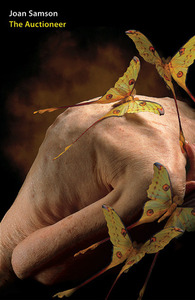You need to sign in or sign up before continuing.
Take a photo of a barcode or cover
adventurous
dark
tense
dark
emotional
mysterious
tense
slow-paced
Plot or Character Driven:
Plot
Strong character development:
Complicated
Loveable characters:
No
Diverse cast of characters:
No
Flaws of characters a main focus:
Complicated
A slow build, but has an underlying tension throughout. By the end, felt like I was holding my breath.
Enjoyed it, but the ending left a little to be desired!
dark
mysterious
slow-paced
Plot or Character Driven:
Plot
Strong character development:
Yes
Loveable characters:
Complicated
Diverse cast of characters:
No
Flaws of characters a main focus:
N/A
Fav of the year so far. A horrifying book about belonging and fear of change. A love letter to one's land. Set in a historical moment, a cultural shift.
A fast talking auctioneer takes up residence in a rural New Hampshire town and sets up a weekly auction to benefit the sheriff’s department. The sheriff, on behalf of the auctioneer, visits all the residents, collecting up things they may regard as junk, but that city folks might use as part of their rustic decor.
Trouble is, the sheriff and his growing number of armed deputies, and the auctioneer himself, keep showing up every week demanding more. It seems the auctioneer is now running the town and bleeding it dry.
The author does a good job at capturing plain rural speech, and building a sense of dread. The final auction we see before the climax is chilling indeed.
The auctioneer, Perly Dunsmore, is one of those sinister literary characters that seem to appear out of nowhere and serve dark forces, like Stephen King’s Randall Flagg and Cormac McCarthy’s Judge Holden.
My only beef is that, for a relatively short novel, the buildup to the climax seems predictable and long in coming.
Still, I can see why this novel is coming to be regarded as a modern classic. It has sort of a timeless feel, like a story by Bradbury or Shirley Jackson, and concerns the fears of rural folk who feel beset and victimized by more “sophisticated” city folks. Almost 50 years after it’s original publication, a tale about such fears seems to resonate even more in the age of Trump
Trouble is, the sheriff and his growing number of armed deputies, and the auctioneer himself, keep showing up every week demanding more. It seems the auctioneer is now running the town and bleeding it dry.
The author does a good job at capturing plain rural speech, and building a sense of dread. The final auction we see before the climax is chilling indeed.
The auctioneer, Perly Dunsmore, is one of those sinister literary characters that seem to appear out of nowhere and serve dark forces, like Stephen King’s Randall Flagg and Cormac McCarthy’s Judge Holden.
My only beef is that, for a relatively short novel, the buildup to the climax seems predictable and long in coming.
Still, I can see why this novel is coming to be regarded as a modern classic. It has sort of a timeless feel, like a story by Bradbury or Shirley Jackson, and concerns the fears of rural folk who feel beset and victimized by more “sophisticated” city folks. Almost 50 years after it’s original publication, a tale about such fears seems to resonate even more in the age of Trump
The Auctioneer is having a bit of a renaissance at the moment. Much lauded at the time of its release, the untimely death of its author left it being forgotten before a string of recent rereleases have brought it back into the discussion. This is a classic take on the city versus countryside. Set in small town rural America, it plays on the sense of community that is present in those type of places and the ease there is for it to be abused.
In this story we follow a family living on the edge of a farming community. When a slick city person moves to town and asks for donations for an auction to raise money for improving the police force, they donate generously. This community spirit becomes the mechanism of self destruction in the end as the levers of power are gradually coopted by the newcomers and the community ripped apart.
This is a slow burner of a novel. It focuses very much on the horror that humans can do to one another, how easy it is for institutions to be corrupted. Clever in its own way, it unfortunately did not really hit the spot for me. I can respect what it does, but it was just a bit too slow for me.
In this story we follow a family living on the edge of a farming community. When a slick city person moves to town and asks for donations for an auction to raise money for improving the police force, they donate generously. This community spirit becomes the mechanism of self destruction in the end as the levers of power are gradually coopted by the newcomers and the community ripped apart.
This is a slow burner of a novel. It focuses very much on the horror that humans can do to one another, how easy it is for institutions to be corrupted. Clever in its own way, it unfortunately did not really hit the spot for me. I can respect what it does, but it was just a bit too slow for me.
slow-paced
Loveable characters:
No
Diverse cast of characters:
No
A creepy slow burn, the Shirley Jackson comparisons are on the money. I can see why it's an influence on Needful Things as well. I found this more horrible and plausible than a lot of genre horror. Plus it stands up well, doesn't read like a 70s novel.
dark
emotional
mysterious
tense
slow-paced




